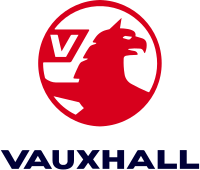
Back Vauxhall Motors Afrikaans فوكسهول موتورز Arabic فوكسهول موتورز ARZ واکسول موتورز AZB Vauxhall Motors Catalan ڤۆکسھۆڵ مۆتۆرز CKB Vauxhall Motors Czech Vauxhall Motors Danish Vauxhall Motors German Vauxhall Motors Greek
 | |
| Formerly |
|
|---|---|
| Company type | Subsidiary |
| Industry | Automotive |
| Founded | 1857[1] |
| Founder | Alexander Wilson |
| Headquarters | |
Number of locations | Two manufacturing facilities in the United Kingdom |
Area served | United Kingdom |
Key people | James Taylor (MD)[note 1][2] |
| Products | |
Production output | 118,182 (2016 passenger cars)[3] |
| Services | Vehicle financing |
| Revenue | |
| Total assets | |
| Total equity | |
Number of employees | 4,029 (2011) |
| Parent | Stellantis |
| Website | vauxhall |
| Footnotes / references [5] | |
Vauxhall Motors Limited[note 2] is a British[6] car company headquartered in Chalton, Bedfordshire, England. Vauxhall became a subsidiary of Stellantis in January 2021.
Vauxhall is one of the oldest established vehicle manufacturers and distribution companies in the United Kingdom. It sells passenger cars, and electric and light commercial vehicles under the Vauxhall marque nationally, and used to sell vans, buses, and trucks under the Bedford brand.[7][8]
Vauxhall was founded by Alexander Wilson in 1857 as a pump and marine engine manufacturer. It was purchased by Andrew Betts Brown in 1863, who began producing travelling cranes under the company, renaming it "Vauxhall Iron Works".[9] The company began manufacturing cars in 1903, and changed its name back around this time. It was acquired by American automaker General Motors (GM) in 1925.[7] Bedford Vehicles was established as a subsidiary of Vauxhall in 1930 to manufacture commercial vehicles.
It was a luxury car brand until it was bought by General Motors, who thereafter built mid-market offerings. From the time of the Great Depression Vauxhall became increasingly mass-market. Since 1980, Vauxhall products have been largely identical to those of Opel, and most models are principally engineered in Rüsselsheim am Main, Germany.[10] During the early 1980s, the Vauxhall brand was withdrawn from sale in all countries apart from the UK. At various times during its history, Vauxhall has been active in motorsports, including rallying and the British Touring Car Championship. After 92 years under GM's ownership, Opel/Vauxhall was sold to Groupe PSA in 2017.[11]
Vauxhall has major manufacturing facilities in Luton (commercial vehicles, IBC Vehicles) and Ellesmere Port (passenger cars). The Luton plant employs around 900 staff and has a capacity for building around 100,000 units a year.[12] In 2012, the Ellesmere Port plant employed around 1,880 staff and had a theoretical (three-shift) capacity around 187,000 units a year.[12] Vauxhall-branded vehicles are also manufactured in Opel factories in Germany, Spain, and Poland.
The current car range includes the Astra (small family car), Corsa (supermini), Crossland (subcompact crossover SUV), Mokka (subcompact SUV), and Grandland (compact SUV). Vauxhall sells high-performance versions of some of its models under the GSe sub-brand. Significant former Vauxhall production cars include the Victor, Viva, Chevette, and Cavalier.
- ^ "Vauxhall Motors". Vauxhall History. Vauxhall Civic Society. 26 February 2012. Retrieved 23 February 2021.
- ^ "Vauxhall announces new management team" (Press Release). Stellantis. 19 May 2022.
- ^ "17 year high for British car manufacturing as global demand hits record levels". The Society of Motor Manufacturers and Traders (SMMT), London. 26 January 2017. Retrieved 8 February 2018.
- ^ a b c d e "Vauxhall Motors Ltd. Annual Report and Financial statements for the year ended 31 December 2019" (PDF). Vauxhall Motors. Retrieved 6 November 2020 – via Companies House.
- ^ "Form 10-K Annual Report Pursuant to Section 13 or 15(d) of the Securities Exchange Act of 1934 for the Fiscal Year Ended December 31, 2012 Commission File Number 001-34960 General Motors Company" (PDF). General Motors Company. 15 February 2013. Archived from the original on 6 August 2013. Retrieved 6 August 2013.
- ^ "Companies House". Companies House. Retrieved 20 September 2017.
- ^ a b "Vauxhall Motors: a history". The Guardian. UK. 10 September 2009. Retrieved 1 October 2010.
- ^ Cite error: The named reference
PSA-GM 2017-03-06was invoked but never defined (see the help page). - ^ "Andrew Betts Brown". Graces Guide. Retrieved 28 June 2019.
- ^ Simister, John (12 July 2009). "Vauxhall Astra". The Independent. UK. Archived from the original on 11 August 2022. Retrieved 25 August 2010.
- ^ "GM and Opel: It's complicated… and has been for decades". Autoweek. 6 March 2017. Retrieved 28 June 2019.
- ^ a b "About Vauxhall". General Motors UK Limited. Archived from the original on 6 August 2012. Retrieved 30 July 2012.
Cite error: There are <ref group=note> tags on this page, but the references will not show without a {{reflist|group=note}} template (see the help page).